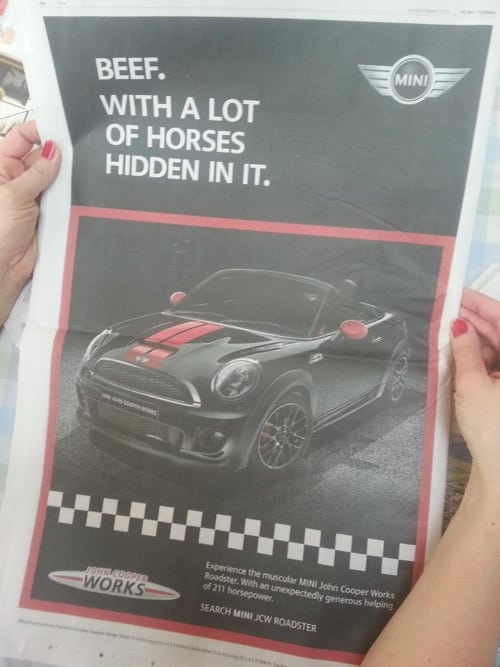During the Super Bowl, Oreo was praised for being quick on the draw to produce and tweet a picture referencing the 3rd quarter power outage:
Power out? No problem. twitter.com/Oreo/status/29…
— Oreo Cookie (@Oreo) February 4, 2013
The tweet received widespread praise and universal kudos, not for being particularly clever or witty, but moreso because Oreo managed to be so damn quick about it. Slate has a good writeup of the tweet that “dazzled a nation.” And it is dazzling, mostly because I’m impressed that a brand as large as Oreo managed to put the ball in motion and get approval and collaboration from different departments to execute this so damn quickly. Anyone who’s worked at a larger agency or in a more corporate environment knows how butt-puckeringly slow marketing processes tend to take, so the fact that Oreo was able to cobble together an image poking fun of the Super Bowl blackout within minutes feels practically miraculous.
Now it appears as if other big brands are slowly starting to understand this “culture-jacking” thing, where timing a response to a widespread cultural event is crucial, especially in today’s social media-focused environment. Take the Mini Cooper, for example. On the heels of Europe’s recent horse meat scandal (in which a substantial amount of beef being sold and distributed across the pond was revealed to contain at least 1% horse meat), they put together this cheeky ad:

From a brand’s perspective, “culture-jacking” is, for the most part, a win. It shows your company has a fun, lively side, and everyone is typically impressed whenever a brand shows it has a sense of humor. Personifying your company via social media and content sharing gives folks a good impression of the types of people behind the brand.
So, is “culture-jacking” an option for your brand? Sure, I think so. But in order to do it successfully, you need the following:
- Speed! Timing is everything. If some huge news is spreading across the Internet, you need to get your team organized and work to produce and launch a related piece as quickly as possible. This means collaborating and being able to hunt down the right person to get approval to move forward. If you don’t have a fast-acting team, you’re going to be late to the party and your idea may not resonate or spread nearly as well.
- Visuals! Written content probably won’t cut it. If you want something to spread like wildfire across different social media channels, an image or super short video will be vastly more successful than a list or editorial. People can view it, enjoy it, and pass it along in a matter of seconds. Do you have a graphics person or a team who can whip up something quickly?
- A halfway decent idea! I say “halfway decent” because the idea doesn’t necessarily have to be pants-crappingly original. Like I said, timing is everything, so if you’re the first one to push out a somewhat obvious joke, you’ll be given points for getting there first. But still, some cleverness or wit is required. The Oreo tweet and the Mini Cooper ad are amusing and would have stood out on their own; the timeliness just added more oomph. But don’t get bogged down trying to come up with the perfect joke or reference — once again, timing, people. Pick from the first few ideas that come to mind and go with the strongest one. You’ve no time to waste!
Keep in mind, however, that “culture-jacking” should be a relatively harmless and fun endeavor. If you’re offering Hurricane Deals in the wake of Sandy devastation or trying to piggyback on national tragedies, you’ll attract a lot of attention, sure, but it probably won’t be positive. Err on the side of caution — Mini Cooper’s horse meat joke is toeing the line, but nobody’s getting hurt from eating horse meat (aside from the horses who’ve ended up in it), so I doubt they’ll see much of a backlash. But you might not want to go too controversial (unless that’s your thing) — be creative but not crass, witty but not withering, oddball but not offensive. (Alliteration FTW!)
That said, you should consider giving “culture-jacking” a try. It’ll be a fun project for your employees to get the creative juices flowing, and it could bring some positive attention to your brand. You don’t have to be a hugely successful Fortune 500 company to do it, either; try it out with your smaller, more niche audience and see how it spreads.
What are your thoughts on “culture-jacking”? Have you executed a campaign of this nature before? If so, how did it go?
